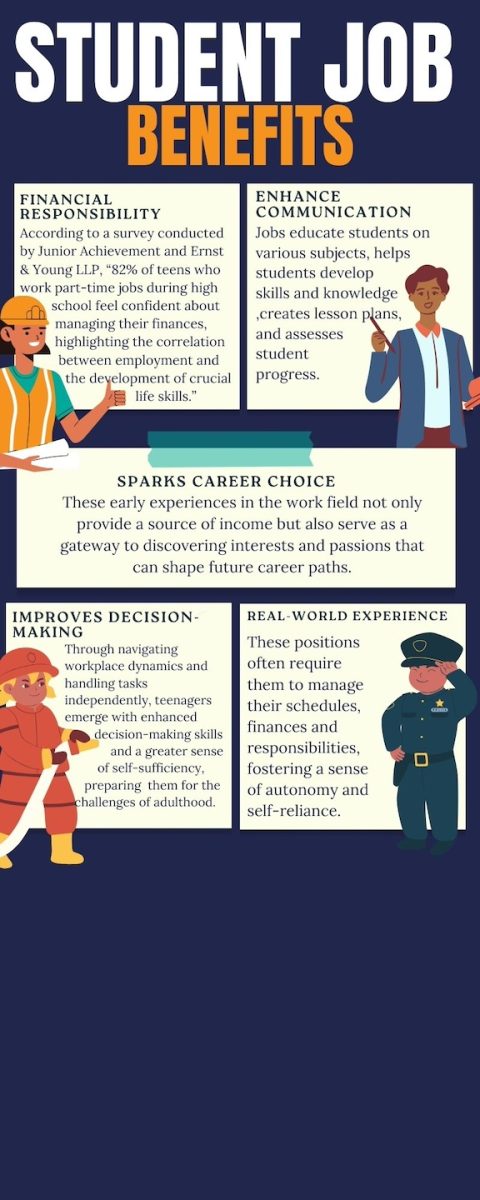In the whirlwind of teenage life, where social pressures and academic demands compete for attention, the notion of taking on a job as a high school student might seem daunting or even unnecessary. However, beneath the surface lies a trove of vital experiences and lessons waiting to be unearthed.
While juggling the stresses of tests, quizzes and extracurriculars on top of having a job may appear to be a challenging task, the values that lie beneath prove it to be essential. According to the Society of Education and Science, “In 2022, around 20.3 percent of teenagers between ages 16 and 19 were employees while enrolled at school in the United States. This is an increase from the previous year, when 19.4 percent of teenagers were working while in school.”
However, employment during high school isn’t merely about earning pocket money; it’s about cultivating essential life skills that transcend beyond the classroom. Within the workplace, students learn the nuances of integrity, teamwork and effective communication, traits quintessential for success in any endeavor. As teens begin to transition from resumes filled with babysitting and lawn mowing positions in retail associates, baristas and child care workers they cultivate real-world interactions with customers, thus expanding their horizons.
In addition to gaining valuable work experience through real-world interactions, teenagers gain independence by taking on real jobs during high school. These positions often require them to manage their schedules, finances and responsibilities, fostering a sense of autonomy and self-reliance. Through navigating workplace dynamics and handling tasks independently, teenagers emerge with enhanced decision-making skills and a greater sense of self-sufficiency, preparing them for the challenges of adulthood.
Through the process of earning their own income, teenagers develop responsibility and a sense of pride in their achievements, lessons that resonate far beyond the realm of monetary gain. According to a survey conducted by Junior Achievement and Ernst & Young LLP, “82% of teens who work part-time jobs during high school feel confident about managing their finances, highlighting the correlation between employment and the development of crucial life skills.”
Despite the undeniable benefits, the dwindling participation of teenagers in the workforce—35% today compared to nearly 60% in 1979—reflects a concerning trend. This decline deprives young minds of invaluable lessons best learned through firsthand experience. Many teens avoid taking the leap into the workforce because of the fear of it negatively impacting their social lives or education. However, it is vital that teens take the first step now so they are prepared when the time comes to start their careers in the workforce.
For many, the first jobs teenagers work spark career choice. These early experiences not only provide a source of income but also serve as a gateway to discovering interests and passions that can shape future career paths. According to a study conducted by the Pew Research Center, “46% of adults surveyed reported that their first job played a significant role in shaping their career choice.” Whether it’s flipping burgers at a fast-food joint, interning at a local business, or babysitting for neighbors, these initial forays into the workforce offer invaluable insights into various industries and professions. Moreover, they instill crucial skills such as time management, communication, and problem-solving, which are essential for success in any career. Thus, encouraging high school teens to explore employment opportunities in the real world can be instrumental in helping them make informed decisions about their future endeavors
As high school students begin to carve out their place in the workforce, they not only prepare for the challenges that lie ahead but also lay the foundation for a future characterized by resilience and self-reliance. It’s imperative that teenagers embrace the opportunity to seize their first job, for in doing so, they embark on a journey of personal growth and empowerment that will serve them well in the years to come.








